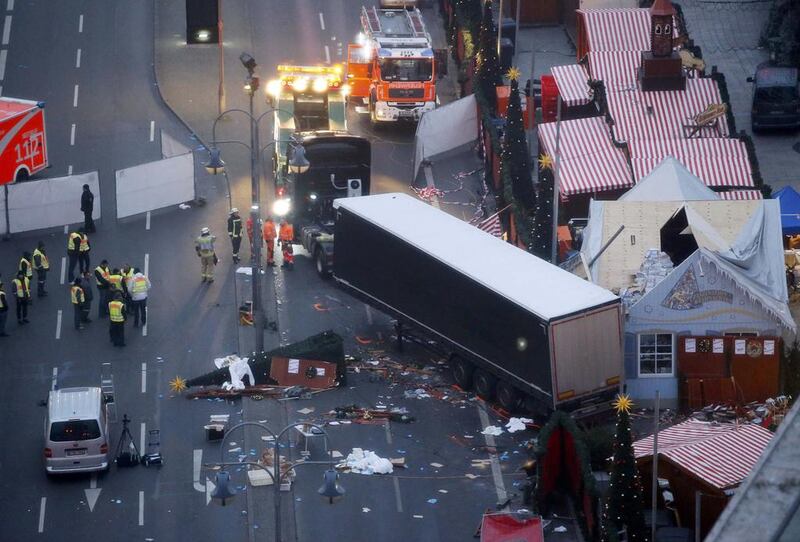BERLIN // ISIL on Tuesday claimed the lorry attack on a Christmas market in Berlin that killed 12 people and wounded at least 48, as German authorities launched a nationwide manhunt for the driver.
A 23-year-old refugee from Pakistan was arrested in a Berlin park shortly after the attack on Monday night. But he was released after police said he had given credible testimony that cast doubt on whether he drove the 25-tonne lorry that rammed into the market on Breidscheidplatz square in the heart of the city.
The detained man also had no gunshot residue on his hands, although a Polish man found dead on the passenger seat of the lorry was killed by gunfire.
The capital’s police chief Klaus Kandt said a “dangerous criminal” may still be at large in the area.
On Tuesday it emerged that the lorry, which was laden with heavy steel, had been hijacked by the attacker while en route to Italy from Berlin. The original driver had been in the lorry at the time and was shot dead by the attacker.
Berlin’s police urged residents to be vigilant. “We don’t know conclusively if there was just one attacker or several or if he or they had supporters,” said Germany’s federal prosecutor, Peter Frank.
It came as the ISIL-linked Amaq news agency posted a statement online saying, “a soldier of the Islamic State carried out the Berlin operation in response to appeals to target citizens of coalition countries”.
Germany is a member of the US-led coalition fighting the extremist group in Syria and Iraq.
Meanwhile, messages of condolence poured in from countries across the world, including from the UAE, which condemned the attack.
The Ministry of Foreign Affairs and International Cooperation stressed that it continued to renounce violence and terrorism in all its forms, saying that such criminal acts targeting innocent civilians are incompatible with human values and ethical principles. The UAE embassy issued warning to Emiratis to take care and avoid crowded places, to carry ID t all times and cooperate with German authorities.
German chancellor Angela Merkel lay flowers at the scene of the attack on Tuesday afternoon and observed a minute’s silence in the shadow of the iconic Kaiser Wilhelm Memorial Church, one of Berlin’s most famous landmarks and a national symbol of peace. The church was left in ruins after it was bombed by the British in the Second World War.
“Twelve people who were still among us yesterday, who were looking forward to Christmas, who had plans for the holidays, are not among us anymore,” she said in an emotional, nationally-televised statement. “A gruesome and ultimately incomprehensible act has robbed them of their lives.”
Martin Germer, the pastor of the Kaiser Wilhelm church, was in the building at the time of the attack and spoke of the carnage he witnessed in the minutes after.
“One of the market traders told me he had briefly left his stall and when he came back two of the people he had only just sold mulled wine to lay on the ground. Dead,” he said.
German security authorities decided on Tuesday that the country’s 2,500 Christmas markets should remain open, although the 60 markets in Berlin were asked to stay closed for the day out of respect for the dead and injured. Concrete barriers were placed at the entrances of some Christmas markets in Berlin, as well as in other cities.
There were reports of the security services receiving warnings of an attack in Germany but that the information wasn’t concrete enough to take specific action.
“We can’t turn Christmas markets into fortresses,” said police chief Mr Kandt. “We have an almost unlimited number of soft targets, there are so many possibilities to kill people with lorries.” More police were being drafted in from other parts of Germany and there will an increased presence of officers armed with submachine guns across the capital, including at the Christmas markets.
Extra security measures will also be put in place for a football match at the Berlin Olympic Stadium on Wednesday and for the annual New Year’s Eve party at Brandenburg Gate, which is expected to attract up to 1 million revellers. The chairman of Germany’s regional interior ministers Klaus Bouillon, said: “We’re in a state of war, although some people don’t want to recognise it.”
Monday night’s incident awakened memories of the attack on July 14 in the French city of Nice when 86 people died after Tunisian-born Mohamed Lahouaiej Bouhlel drove a 19-tonne lorry through crowds which had gathered to watch the fireworks on Bastille Day. Two attacks by asylum seekers this summer in Germany, both claimed by ISIL have also increased tensions over the arrival last year of 890,000 refugees.
The right-wing populist party Alternative for Germany said the attack was an assault on the country’s Christian traditions, and referred to tensions over immigration.
“The Christmas market was not an accidental target. It is not only an attack on our freedom and our way of life, but on our Christian tradition. Germany is a country which is divided over the immigration question,” said leader Frauke Petry.
Fresh details emerged on Tuesday about the attack and its victims.
The owner of the Polish trucking company that owned the lorry involved, Ariel Zurawski, said German authorities had asked him to identify the vehicle’s murdered driver, Lukasz Urban, 37, from photos.
“His face was swollen and bloodied. It was really clear that he was fighting for his life,” Mr Zurawski said. The manager of the trucking company, Lukasz Wasik, described Urban as a “good, quiet and honest person” devoted to his work.
“I believe he would not give up the vehicle and would defend it to the end if attacked.”
Six other victims have so far been identified, all confirmed as German nationals.
As Germany fills in the gaps of what took place on Monday night, Pastor Germer said the attack would not stop the Christmas celebrations.
“Of course in these terrible hours one thinks about how one is to celebrate Christmas,” he said, fighting back tears. “But we will celebrate it. And we will think about the events in France and about what has happened and is happening in Aleppo.”
foreign.desk@thenational.ae
* With additional reporting by Associated Press and Agence France-Presse





